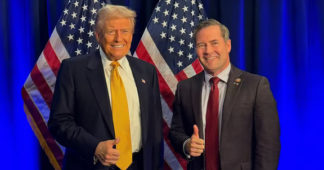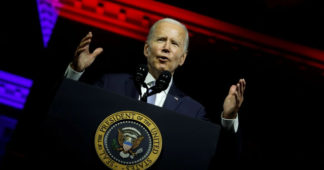By Dimitris Konstantakopoulos
Almost the entire team of Donald Trump’s advisers, along with his son (with the exception of the newly appointed Secretary of State, Marco Rubio), condemned Biden’s decision to allow Ukraine to target deep within Russian territory. However, the press secretary of the newly elected U.S. President subtly, but unmistakably, criticized them, stating that “only official statements on this matter will come directly from President Trump or his authorized spokespeople” (https://www.washingtonpost.
These events likely support the view that it is more of a collusion between Biden and Trump rather than a unilateral decision by the outgoing U.S. President, as we argued in a previous article on the subject titled (No limits to adventurism. They are gambling with the very existence of the Human Race… ).
Moreover, the (foolish) idea of “escalation for de-escalation,” including the use of strikes deep within Russia, has been described in a post-election interview by Trump’s newly appointed National Security Advisor, Mike Walz (https://www.defenddemocracy.
Today’s Western political and technical personnel have extremely limited political and general education. They have been raised in the era of complete American supremacy and have fought only from a position of overwhelming advantage (and even in those cases, they did not succeed very well). They have not (or do not want to) understand the Soviet collapse as anything other than proof of Russia’s total weakness and the West’s complete omnipotence. They did not realize that the Soviet collapse was not solely the result of any weakness or serious problems within the USSR—although those existed—but was largely and primarily the result of the Soviet elites and much of society joining the Western narrative. This alignment had tragic consequences for the societies of the former USSR, for Russia’s international position, and for the 25 million Russians left outside Russia by the dissolution of the USSR, without any consideration of their right to self-determination. The emergence of the Putin’s regime, whether some like it or not, and its turn towards an increasingly combative challenge to Western policies was the unavoidable reaction of a historic nation and not a strange “anomaly” destined to disappear with some outside help, as the West would like to believe.
This lack of realism and deep understanding of the Russian and global situation led to the attempt to seize, even through coup-like methods, a part of the former USSR, and specifically such a crucial one as Ukraine, turning it into a dictatorship, a Western protectorate, and an armed anti-Russian bulwark, and preparing it to enter NATO. Subsequently, they did everything they could to provoke a conflict with Russia, hoping to overthrow its regime and break up the country.
Now they do not want to admit that they played and lost, even though the most prominent representative of Western geopolitics, Zbigniew Brzezinski, warned in his last writings that the “window of opportunity” for global American “monopoly” closed 15 years after the collapse of the USSR, and that this factor had to be taken into account when formulating policy.
In their panic and lacking of any coherent “winning” strategy, American “strategists” are pulling whatever idea they can from the tradition of US politics and applying it blindly to the current reality. David Ignatius for example, referring to Brzezinski, argued back in 2021 that a war in Ukraine would do to Russia what the Afghan war did to the USSR, i.e., it would destroy it. Utter nonsense—first, because Afghanistan played no central role in the Soviet collapse, and second, more importantly, because a conflict in Afghanistan cannot be compared to a conflict in the heart of Europe and the former USSR. Now Walz wants to “escalate to de-escalate,” mimicking Kennedy’s policy toward Vietnam (and somewhat the ideas that inspired NATO’s risky “flexible response” strategy), forgetting, however, that first, Kissinger’s policy failed, and the only thing it achieved was prolonging the Vietnam War, and second, that Vietnam cannot be compared to a nuclear and technological superpower like Russia.
Escalations lead usually to more escalations, not de-escalations. They are policies of desperation, not strategies of victory.
Even now, in the face of the prospect of a strategic defeat—or precisely because of the panic it provokes, and perhaps their fear that the Ukrainian regime could soon collapse—they are struggling to find the courage and rationality to end the conflict, accepting a neutrality arrangement for Ukraine. This, despite the fact that the possibility of a victory over Russia has become inconceivable, while the destructive consequences of further escalation grow ever more apparent.
They think they will communicate with Russia by launching missiles, not by talking to it!
Although it seems likely that Trump approved Biden’s decision, and despite the fact that he has already appointed a series of the most dangerous neoconservative hawks in his government (The Foreign Policy Cabinet of the Supposedly ‘Anti-War’ President-Elect Begins to Take Shape), one hopes that the new US President will find the courage to stop the descent into Armageddon, keeping his pre-election promises. Unfortunately, though, it is not at all certain. It is merely a hope in a very dangerous situation.
What is especially sad, however, is that he is facing so little pressure to do so from public opinion, intellectuals, and political forces on both the right and the left in the U.S. and Europe. The left, in particular, complains a great deal about the rise of the far right internationally, but has yet to realize that its alignment, fortunately not of all its forces, with NATO’s war in Ukraine and Western imperialism as a whole, or at best its cowardice in condemning it, effectively nullifies it as a political force with an alternative plan to the establishment and significantly contributes to the rise of the far right. Just as the submission of the German Social Democrats to the Kaiser in 1914 did not prevent, but helped, Hitler’s rise in 1933.
Europe is already grappling with an economic crisis due to its policy on Ukraine. We have increased greenhouse gas emissions by relying on US LNG instead of Russian natural gas. The European Union has effectively become a subsidiary of the U.S., militarizing as if our most pressing need is not to address the dramatic social and ecological crises, but to purchase and develop new weapons. And, to top it all off, we are now threatened with the specter of nuclear annihilation!
How much longer will we continue to passively accept this policy? How close to the nuclear destruction of humanity must we get before our societies, political forces, unions, and intellectuals are mobilized?











